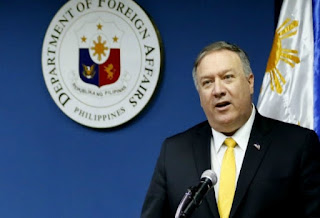US Secretary of State Mike Pompeo on Friday vowed to defend the Philippines against "armed attack" in the disputed South China Sea in Washington's starkest warning yet against Chinese claims to most of the strategic waterway. Speaking in Manila after meeting with Philippine President Rodrigo Duterte, Pompeo said Beijing's building of artificial islands in waters also claimed by Manila and other neighbours were potential threats to the two allies.
"China's island-building and military activities in the South China Sea threaten your sovereignty, security and therefore economic livelihood, as well as that of the United States," he said at a joint news conference with Philippine Foreign Secretary Teodoro Locsin.
"As the South China Sea is part of the Pacific, any armed attack of Philippine forces, aircraft or public vessels in the South China Sea will trigger mutual defence obligations under Article 4 of our Mutual Defence Treaty." Pompeo's comments marked the first time any US official had publicly stated Washington's intent to defend its ally in the flashpoint sea.
A 1951 US-Philippine mutual defence treaty committed Manila and its former colonial master to come to each other's aid in case of an "armed attack in the Pacific area" on either party. Senior Duterte officials have called for a review of the mutual defence pact with the US because they were unsure whether it applied to the South China Sea row.
Philippine troops, as well as fishermen, have frequently complained about harassment by Chinese maritime security forces around some of the islands and reefs occupied by Filipino troops. The United States has said it is not taking sides in the disputes over South China Sea islands and waters claimed by China, the Philippines, Brunei, Malaysia, Taiwan and Vietnam. Beijing claims most of the sea.
However, Washington has asserted its right to freely sail its military and merchant vessels over waters through which trillions of dollars in global trade pass through each year and which reputedly contain vast mineral and oil reserves. The Philippines was previously one of the staunchest critics to China's island-building and militarization of the islands.
But Duterte put the dispute on the back burner when he was elected president in 2016 in favour of chasing Chinese trade and investment. He threatened a split with the United States and called then US President Barack Obama a "son of a whore". Relations are being rebuilt under US President Donald Trump, who has hailed Duterte's actions -- including a drugs crackdown that has claimed thousands of lives -- as a sign of toughness.
Foreign Secretary Locsin on Friday downplayed his government's suggestions for a review of the US defence pact, saying in its "vagueness lies the best deterrence".
"They (US forces) will respond depending on the circumstances but we are very assured, we are very confident that the United States has, in the words of Secretary Pompeo and words of President Trump to our president: we have your back," Locsin said.
"China's island-building and military activities in the South China Sea threaten your sovereignty, security and therefore economic livelihood, as well as that of the United States," he said at a joint news conference with Philippine Foreign Secretary Teodoro Locsin.
"As the South China Sea is part of the Pacific, any armed attack of Philippine forces, aircraft or public vessels in the South China Sea will trigger mutual defence obligations under Article 4 of our Mutual Defence Treaty." Pompeo's comments marked the first time any US official had publicly stated Washington's intent to defend its ally in the flashpoint sea.
A 1951 US-Philippine mutual defence treaty committed Manila and its former colonial master to come to each other's aid in case of an "armed attack in the Pacific area" on either party. Senior Duterte officials have called for a review of the mutual defence pact with the US because they were unsure whether it applied to the South China Sea row.
Philippine troops, as well as fishermen, have frequently complained about harassment by Chinese maritime security forces around some of the islands and reefs occupied by Filipino troops. The United States has said it is not taking sides in the disputes over South China Sea islands and waters claimed by China, the Philippines, Brunei, Malaysia, Taiwan and Vietnam. Beijing claims most of the sea.
However, Washington has asserted its right to freely sail its military and merchant vessels over waters through which trillions of dollars in global trade pass through each year and which reputedly contain vast mineral and oil reserves. The Philippines was previously one of the staunchest critics to China's island-building and militarization of the islands.
But Duterte put the dispute on the back burner when he was elected president in 2016 in favour of chasing Chinese trade and investment. He threatened a split with the United States and called then US President Barack Obama a "son of a whore". Relations are being rebuilt under US President Donald Trump, who has hailed Duterte's actions -- including a drugs crackdown that has claimed thousands of lives -- as a sign of toughness.
Foreign Secretary Locsin on Friday downplayed his government's suggestions for a review of the US defence pact, saying in its "vagueness lies the best deterrence".
"They (US forces) will respond depending on the circumstances but we are very assured, we are very confident that the United States has, in the words of Secretary Pompeo and words of President Trump to our president: we have your back," Locsin said.

No comments:
Post a Comment